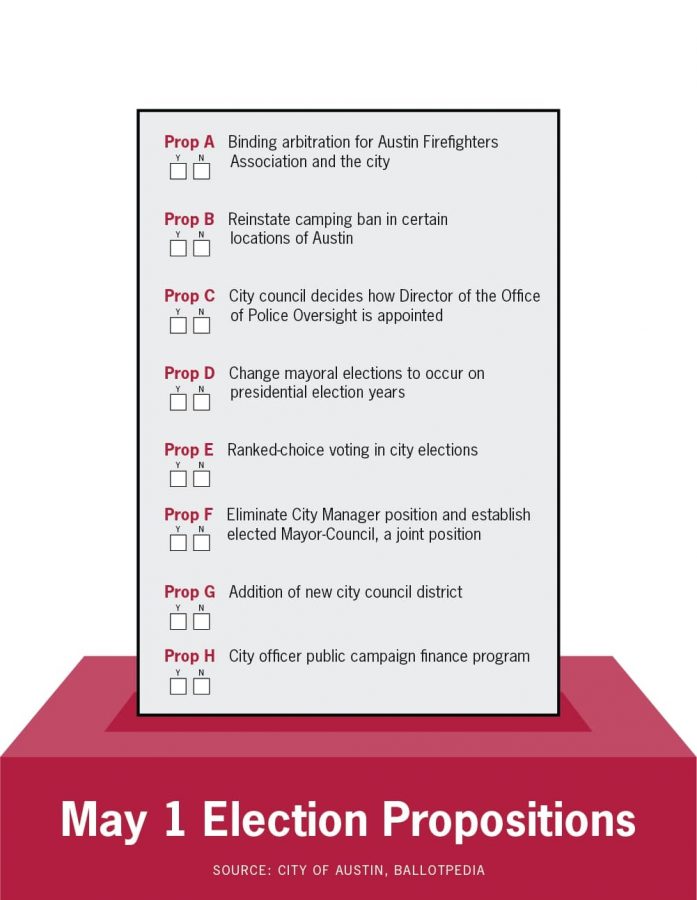Know what you’re voting for: May 1 ballot propositions explained
April 27, 2021
Editor’s Note: This article first appeared in the April 23 issue of The Daily Texan.
Austin residents can vote on propositions covering camping bans for unhoused people, rearranging the Austin City Council structure and more in a special election May 1.
Early voting runs April 19-27, and locations can be found on the Travis County Clerk’s website. All propositions require a simple majority vote to pass and would amend the city charter if passed. Here’s what each proposition would mean if approved.
Proposition A
Proposition A would allow the Austin Firefighters Association to use an arbitrator, an independent person or body who settles disputes, if an agreement cannot be made with the city during collective bargaining, such as wage negotiation.
Proposition B
Proposition B would reinstate the city’s camping ban for unhoused residents in certain areas of the city, including the University and areas surrounding downtown.
The proposition would criminalize sitting, lying down or sleeping in specified public areas, such as sidewalks. Soliciting would also be criminalized between 7 p.m. and 7 a.m., and people would only be able to camp in areas designated by the Parks and Recreation Department.
A majority “yes” vote on this proposition would reverse the 2019 city council decision that allowed camping in public places around Austin.
Proposition C
Proposition C would give the city council the power to both appoint and remove the director of the Office of Police Oversight. This power is currently held by the city manager.
The Office of Police Oversight hears and addresses complaints of police misconduct in Austin. The office can also file its own complaints and currently works with the city manager to make recommendations about investigations and individual transgressions to promote accountability within the Austin Police Department.
Proposition D
Proposition D would move Austin’s mayoral elections to coincide with presidential elections. Although mayors serve four year terms, if approved, the mayor elected in 2022 would only serve until the 2024 presidential election.
The proposition aims to increase voter turnout for mayoral elections because turnout is generally higher in presidential years than midterms.
Proposition E
Proposition E would establish a ranked-choice voting system for city elections, which would aim to ensure a more accurate representation of voters and prevent runoff elections. The ranked-choice system would replace the single-candidate voting system in use now.
Ranked voting is not explicitly against state law, but there is no prior precedent for it. If approved, the proposition would then need to be approved by a state court.
Proposition F
Proposition F would consolidate the city manager and mayor positions into a single mayor-council position. This would give the mayor veto power over city council budget decisions.
Voters elect the mayor while the Austin City Council appoints the city manager, but the new joint position would be elected.
The mayor-council would also be able to hire and fire city department heads and direct staff in city departments, which only the city manager has the power to do now.
Proposition G
Proposition G would add a geographic city council district based on 2020 census redistricting efforts, raising the number of council members from 10 to 11.
If proposition F were to pass, the city council would be left with a 10-vote structure as the mayor-council would no longer be part of the voting council, which could result in voting ties. Proposition G could solve this issue, but if only one of the propositions passes, the council would be left with an even number.
Proposition H
Proposition H would create a public campaign finance program that would give each registered Austin voter two $25 vouchers to contribute to political campaigns. This aims to increase voter participation, especially in low-income communities.



